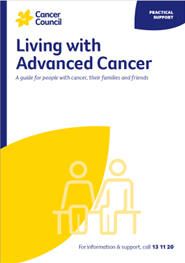- Home
- About Cancer
- Advanced cancer
- Living with advanced cancer
- Key questions
- How will advanced cancer affect my day-to-day life?
How will advanced cancer affect my day-to-day life?
Some people with advanced cancer can stay reasonably well and continue usual activities – working, playing sport and socialising – for a long time. Other people may need to focus on their health. It will depend on how you feel, and how cancer or treatment changes various aspects of your life.
Emotional changes
Being told you have cancer, or that it’s come back, can have a huge emotional impact. The actual cancer and any treatment you have can also change how you feel – for example, some hormone treatments directly affect people’s moods. It can
be difficult to cope with the feeling of uncertainty and the stress of changes to your work, finances and relationships. For more on this, see Ways to manage how you’re feeling.
Side effects
The cancer, or its treatment, may cause a range of side effects, such as pain, nausea, fatigue or breathlessness.
These can affect what you can comfortably do and your sense of independence. For more on this, see Managing symptoms.
Money concerns
You or a partner may need time off work, or you may have treatment or other costs that add up. This can lead to worry about money, or a need for financial assistance. For more on this, see Dealing with bills and debts.
Practical issues
There may be ways to make life more comfortable, such as using medical equipment, modifying your home, or getting home help. If you travel a long way from home to the hospital, you may need assistance with transport or somewhere to stay.
Call Cancer Council on 13 11 20 to find out about options open to you.
→ READ MORE: Will palliative care help?
Podcast: What does Advanced Cancer Mean?
Listen to more of our podcast for people affected by advanced cancer
More resources
Dr Lucy Gately, Medical Oncologist, Alfred Health and Walter and Eliza Institute for Medical Research, VIC; Dr Katherine Allsopp, Supportive and Palliative Care Specialist, Westmead Hospital, NSW; A/Prof Megan Best, The University of Notre Dame Australia and The University of Sydney, NSW; Dr Keiron Bradley, Palliative Care Consultant, Medical Director Palliative Care Program, Bethesda Health Care, WA; Craig Brewer, Consumer; Emeritus Professor Phyllis Butow, Psychologist, The University of Sydney and Chris O’Brien Lifehouse, NSW; Louise Durham, Palliative Care Nurse Practitioner Outpatients, Princess Alexandra Hospital, Metro South Palliative Care, QLD; Dr Roya Merie, Radiation Oncologist, ICON Cancer Centre, Concord, NSW; Penny Neller, Project Coordinator, National Palliative Care Projects, Australian Centre for Health Law Research, Queensland University of Technology, QLD; Caitriona Nienaber, 13 11 20 Consultant, Cancer Council WA; Xanthe Sansome, Program Director, Advance Care Planning Australia, VIC; Sparke Helmore Lawyers; Peter Spolc, Consumer.
View the Cancer Council NSW editorial policy.
View all publications or call 13 11 20 for free printed copies.
Need to talk?
Support services
Coping with cancer?
Speak to a health professional or to someone who has been there, or find a support group or forum
Looking for transport, accommodation or home help?
Practical advice and support during and after treatment
Cancer information
Dealing with the diagnosis
Common reactions to a cancer diagnosis and how to find hope
Explore our resource hub
Explore and download our booklets, fact sheets, podcasts, webinars and videos for people affected by cancer

